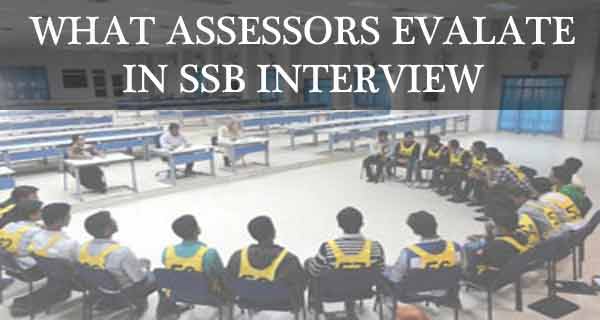SSB interview procedure is very secretive in nature and many aspirants do not know what assessors actually evaluate during the 5 days of testing. Read on to know about how assessors evaluate in SSB interview.

So, you’ve read a lot about how to clear the PPDT story writing and how to perform well in the narration. But after all this, you just wonder, what are they actually looking for in you through the Screening while you can be evaluated in the further SSB.
SSB Screening Test Assessment Procedure
Here’s the answer by the SSB assessors themselves so as to what they look in a candidate in Screening and why they aren’t allowed to stay for the whole testing.
The funda here is simple, there are a lot of candidates and the only people they are looking for are the ones having OLQs. Yes, they will check all of your OLQs just in the Screening. For the uninitiated, Screening consists of, Reasoning, Aptitude, English, GD, Story Writing, Narration among various other tests. So, Stage-1 is like a mini Stage-2 testing where no of candidates are shortlisted for in—depth testing.
The Officer’s Intelligence Rating consists of Verbal Reasoning and Non-Verbal reasoning. Using this test, the assessors test the Intelligence Quotient of the candidate, also known as IQ. This test also shows problem-solving skills of the candidate. But however, this test is secondary only to the PPDT. In simple words, if there is a candidate who couldn’t perform well in PPDT but have a good strong story, their IQ will be taken into consideration for further testing.
Therefore, OIR is a test if reasoning and aptitude which you have to display while narrating your story in PPDT. After your OIR, your scores are evaluated in Verbal and Non-Verbal tests manually and fed into a computer. Then this computer gives an OIR of the candidate on a scale of 1 to 5. 1 is considered the best and 5, the poorest rating.
After the OIR test is completed, it’s now time for PPDT. The whole screening is based on how you perform in PPDT. After your story, as you move on to the narration, all your OIRs will be available with the assessors. Generally, the assessors do not read your story but rely on how you narrate it to them. Then they map it against your OIR. Therefore, the heart of screening is narration and GD.
You are assessed based on the same 15 OLQs in the screening test. Just that candidates are not tested in depth in screening owning to the large number of them. For instance, if a candidate is having an OIR of 1 and is also poor in narration and GD, he/she is surely eliminated. But if there are instances where candidate have an OIR of 5 but is again poor in narration or he has an OIR of 1 and is extremely good in narration, then the assessors give their response in “Yes”, “No” or “Doubtful”. For those who are “Doubtful” are decided based on further discussions and OIR.
During GD, try not to be those candidates who never let others speak and don’t even be the ones who never speak. What they are looking for are the candidates who participate in the discussion, let others speak and listen to them. Hence, narration and GD are the essences of Screening and heart of stage-1 selection.
So, to summarise, focus more on your speaking skills. Practice English speaking as much as possible and include new words in your vocabulary. Read English newspapers and watch English news channels. These will help you in being up to date apart from improving your vocabulary and English, hence ultimately develop English speaking skills.
Now that you know the evaluating criteria of SSB assessors, it’s not hard to clear the screening yet. Just remember, do not let them know that you know what they know.

Discussion Board
No comments received yet. Be first to comment.
Please Login to write your comment.